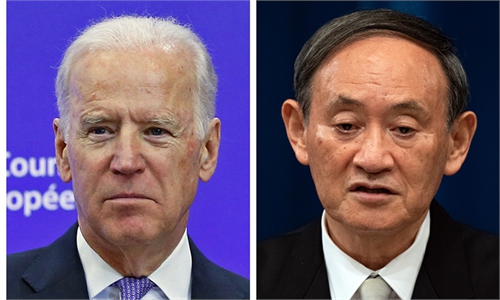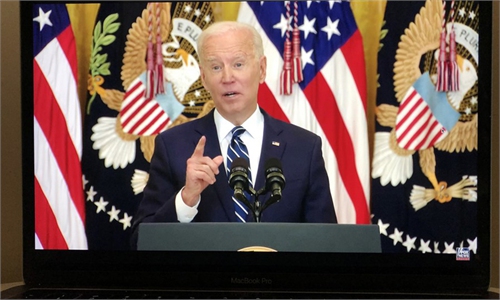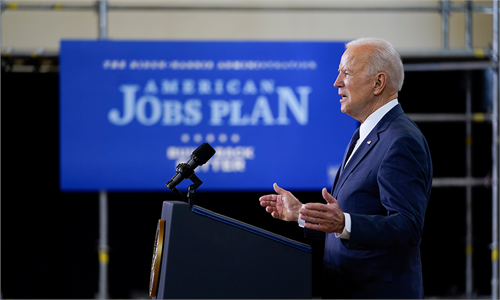Washington’s ‘Sinophobia, Russophobia cost high’
Increasing budget won’t help US to contain China, Russia at the same time: experts
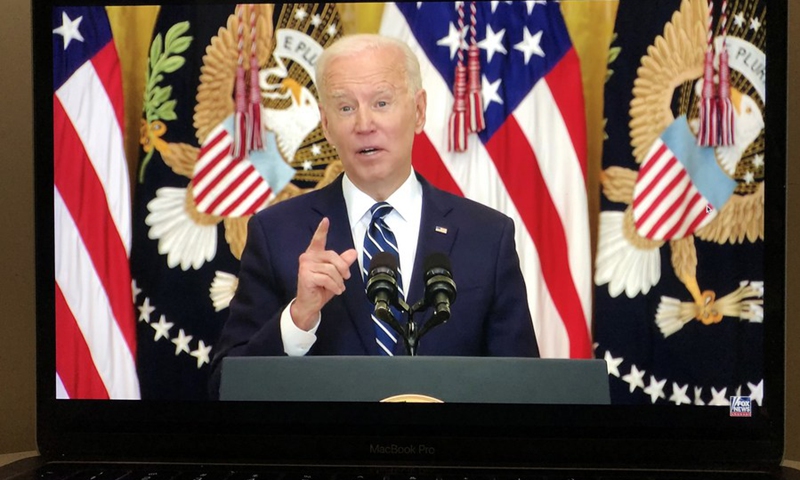
The recently unveiled $715 billion defense budget by the Biden administration to counter the so-called threats from China and Russia - a real cost of Washington's Russophobia and Sinophobia - is a vivid reflection that the defense spending of Washington being kidnapped by military industrial complex, but such high cost would lead it on a path to nowhere as it is unrealistic for the US government to successfully curb two major powers at the same time, Chinese experts said.
US President Joe Biden unveiled his first budget proposal on Friday to Congress, requesting $715 billion for the first Pentagon budget, according to US media reports, signaling efforts to confront China and Russia as the US government identifies China as a "top challenge." The defense budget, to be increased 1.5 percent from that of 2021, aims to deter China and Russia by modernizing the nuclear deterrent, promoting climate resilience and countering emerging biological threats, according to US news site Axios.
Shortly after the budget plan was announced, Russian Foreign Ministry spokesperson Maria Zakharova said in a Facebook post that "the White House declared the price of Russophobia and Sinophobia." The destruction of relations with Russia and China will cost American taxpayers an additional $715 billion. And this is under the US public debt, in September 2020, which grew to $26.9 trillion, the spokesperson said.
To some Chinese experts, a slight increase in budget for the Pentagon is not a surprising move, keeping in step with the level of military spending during the Trump administration. Describing Russia and China as major threats, a major reason laid out by the US officials, is consistent with a consensus among American political elites, Li Haidong, a professor at the Institute of International Relations of the China Foreign Affairs University, told the Global Times on Sunday.
"However, rather than saying that the defense budget increases to echo the reality of US military demand, the that US defense budget growth aims to safeguard the interests of military industrial complex, which is the reality," Li said.
It is an open secret that major defense contractors in the US spend millions of dollars every year to lobby on defense policy. A recent report described the practice as "capitalizing on conflict." Such lobbying tactics are unlikely to change under the Biden presidency, according to observers.
However, will it work out as Biden eyes curbing China and Russia at the same time? The budget proposal does not have bipartisan consensus and some Democrats complained the request is too high and Senate Budget Committee Chairman Bernie Sanders criticized that Biden is not scaling back a "bloated Pentagon." Yet some Republicans consider the budget proposal does not go farther enough, claiming that the US president is sacrificing national security, according to media reports.
The real question in a larger geopolitical context should be whether growth in military spending to counter China and Russia can have any real consequences. Some Chinese experts raised this question, as Washington continues adding up costs in curbing the world's two major powers on global affairs, is it really worth it and is it a realistic goal?
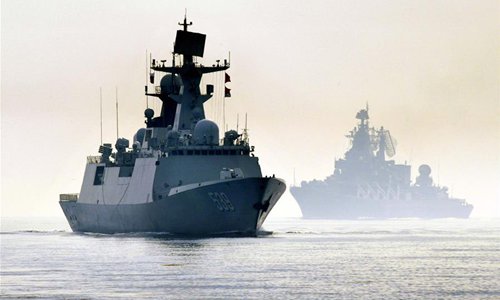
Photo taken on May 4, 2019 shows the naval forces paticipating the "Joint Sea-2019" exercise. A six-day joint naval exercise held by Chinese and Russian navies concluded Saturday in Qingdao, east China's Shandong Province. Two submarines, 13 surface ships, as well as fixed-wing airplanes, helicopters and marines participated in the exercise. (Photo: Xinhua)
Unrealistic goal
The major target of this proposal - to counter China and Russia - is unlikely to be realized, Yang Jin, an expert on China-Russia relations with the Chinese Academy of Social Sciences, told the Global Times on Sunday.
"As two permanent members of the UN Security Council, China and Russia have a significant stake in regional and global security affairs. Meanwhile, as the two countries share a full-scale comprehensive strategic partnership in the new era, the US would find it almost impossible to exclude these two countries on a number of issues such as climate, Iran nuclear talks, Korean Peninsula, Syria and Afghanistan crisis," Yang said.
The economic influence of China and the security and military influence of Russia are significant, as when the two countries cooperate with each other, they will constitute a great challenge to the US, Yang noted.
In the latest Iran nuclear talks, China is considered as the one championing Iran sanctions relief, while the US is "aligned with" China and Russia on some issues since no one wants Iran to have nuclear weapons, the South Morning China Post (SMCP) reported on Wednesday. US State Department spokesman Ned Price was quoted as saying in the SMCP report that there was "alignment in many areas" on the Iran issue with both China and Russia.
Meanwhile the US and Iranian officials clashed on Friday over what sanctions the US should lift to resume compliance with the 2015 nuclear deal, according to a Reuters report.
Wang Qun, the Chinese envoy to the UN and other international organizations in Vienna, reiterated that the US should put into action immediately its promise to lift unilateral sanctions against Iran, calling on the US to take practical actions immediately to facilitate the complete and effective implementation of the Joint Comprehensive Plan of Action.
"Without the participation of China and Russia, the US can't solve the dilemma with Iran nuclear talks," Yang said.
By inheriting the tough stance of its predecessor, the White House today is considered as being engulfed in anti-China and anti-Russia sentiment spontaneously, which would lead to growing provocations on military and diplomacy sides, for example, by US continuing to play its "Taiwan card." The US Department of State announced on Saturday (Beijing time) that it has issued new guidelines for US government interaction with counterparts on the island of Taiwan to encourage US government engagement with the island that reflects their "deepening unofficial relationship."
Besides the military tensions near the island of Taiwan and in the South China Sea in recent days, draft measures entitled the Strategic Competition Act of 2021 were introduced in the US Senate on Thursday, laying out multiple containment measures including sanctions on Chinese officials over Xinjiang, providing military assistance worth billions of dollars to Indo-Pacific allies, and monitoring China's ballistic missiles.
"The latest defense budget just piles on the shared hostility against China as Biden's top China-related policy. Washington is getting into a vicious circle of expanding the scale of the new cold war," Li said.

